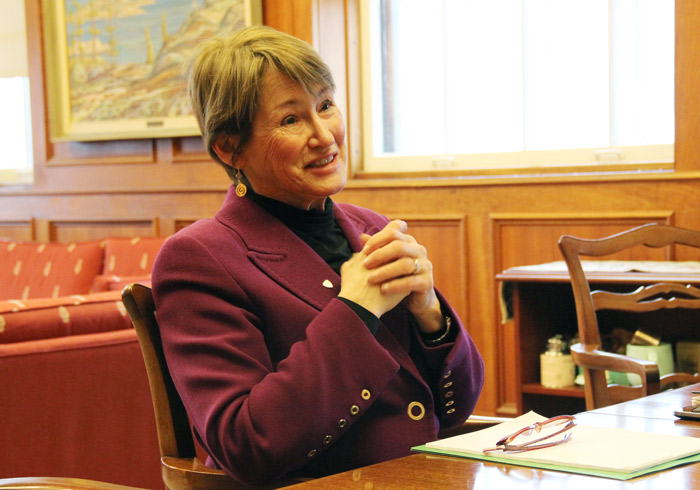From Jan. 17 to 20, McGill Principal and Vice-Chancellor Suzanne Fortier attended the World Economic Forum (WEF) in Davos, Switzerland to discuss labour markets for post-secondary graduates and to present research on sustainability and global connectivity. Fortier was accompanied by Professor Andrew Gonzalez of the Department of Biology, Assistant Professor Graham MacDonald of the Department of Geography, and Associate Professor Elena Bennett of the Department of Natural Resource Sciences and School of Environment. The annual Forum brings together more than 2,500 business leaders, international political figures, prominent researchers, and journalists to discuss current global issues.
Gonzalez, MacDonald, and Bennett jointly hosted a short presentation called an IdeasLab. They discussed research pertaining to their respective fields under the unifying theme of “Shaping a Sustainable World.”
Much of Fortier’s time at the WEF was spent on the topic of how future post-secondary graduates will integrate into the labour market while grappling with the challenges of globalization and the rapid pace of technological change. In a meeting with campus media on Jan. 23, Fortier discussed how a recent McGill initiative to implement internship opportunities will prepare students for success in today’s dynamic labour market.
“What we want to do is increase opportunities for McGill students in all programs to have work-learning experience outside the university, whether it’s in a company, an NGO, or a community group across Montreal [or] across the world,” Fortier said.
Fortier said that not only is it important for graduates to be job-ready, but also “future ready.” In a WEF panel titled “Jobs and the Fourth Industrial Revolution,” Fortier advocated for a university education that prepares students by exposing them to both liberal and technical instruction, something she calls a renaissance education.
“Of course, you cannot easily navigate this world if you have no understanding of science, technology, [and] mathematics,” Fortier said. “It’s an essential component [of a post-secondary education], but I don’t think it’s sufficient, […students] need to be exposed to the arts and humanities. We need to think of a broader education, not a narrower one.”
Gonzalez, whose research is centred on building sustainable cities, elaborated on the need for a more broad-based education, which he believes is more conducive to research.
“It is important that we marry the social and natural sciences and that we give students the opportunity to experience both of these things,” Gonzalez said. “You can’t ask a robot to work on the social dimensions of change, […] of sustainability. Many of the solutions are not strictly technological.”
MacDonald later said that he was pleasantly surprised by the topics of conversation at this year’s forum.
“We are seeing a very obvious focus on [issues such as] food, agriculture, and climate at the Davos meeting this year,” MacDonald said. “I did not expect to see so much discussion concerning these [topics] and it's very inspiring to see this discussion taking place.”
Fortier, who also attended the WEF in 2016, is proud that McGill was the only Canadian university invited to the forum this year.
“The fact that we’re the only Canadian university invited to [Davos] and that we’re a member of the Global University Leaders Forum certainly has a direct impact on students,” Fortier said.
Fortier added that McGill’s invitation to the WEF proves the high academic status of the university.
“The reputation of McGill internationally is obviously very strong and the fact that we are there speaks for itself,” Fortier said.








